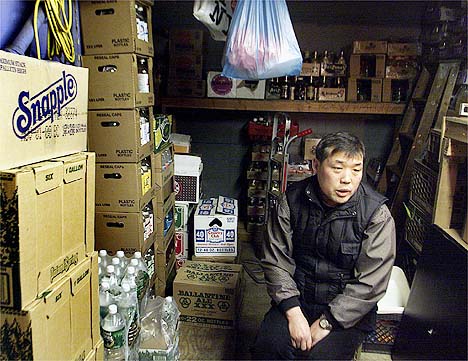 |
 |
 |
 |
 |
 |
 |
 |
 |
 |
 |
 |
 |
 |
 |
 |
 |
 |
 |
 |
 |
 |
|
|
Korean-American Self-Employment |
|
|
|
Why are so many Korean-Americans self-employed?: this is a question often raised in the study of ethnic entrepreneurship. After all, seventeen-percent of Korean-Americans are self-employed (in comparison to seven-percent of the total U.S. population). In fact, by 1987, Asian-Americans in general owned as many stores as African-Americans and even more than Hispanics did.
In the 1990s, most ethnic enterprises--and most stores run by Korean-Americans--were located in the inner city. Although these locations have a high amount of crime and thus a high amount of risk, there is cheap rent, and lessened need for language fluency, and little competition from large store chains in these areas. Most Korean-American businesses were liquor stores, greengrocers, and markets. Additionally, businesses that focused on mass marketing were popular, because they were able to bring popular goods to poorer neighborhoods.
There are three main reasons why Koreans have such high rates of self-employment: their level of education, amount of resources, and unfamiliarity with American culture and customs.
|
|
|
|
 |
|
|
|
Education = 34.5% of Koreans (and 50.6% of Korean males) completed at least four years of college. Consequently, most Korean-Americans have extremely high levels of human capital and are therefore better suited for white-collar and management jobs. Nevertheless, because it is often hard to transfer education from one country to another, many become self-employed so they do not have to take menial positions or redo training in their field. |
|
|
|
|
|
 |
|
|
|
Resources = Resources allow entry into self-employment. Besides having class resources such as human capital, economic capital, and other forms of wealth, Korean-Americans also possess ethnic resources--aid available through their ethnic group. In addition to personal savings, loans from family members and friends, and loans from other small business owners, Korean-Americans are able to raise enough capital to start their own businesses through the use of Rotating Credit Associations (RCAs)--"Kyle" in Korean. In an RCA, each member contributes money into a pot, and they take turns bidding on the sum each time they meet. Whoever wins the bid receives the money; however, this money must be paid back, normally with interest. But this interest is almost always lower than what a bank would charge for a similar loan. In sum, RCAs facilitate entrepreneurship, encourage saving, keep capital from escaping the group, and help borrowers avoid the banking system. However, it also requires a great amount of trust. Nonetheless, a majority of Korean-Americans participate anyway. |
|
|
|
|
|
Unfamiliarity with culture and customs = In Koreatown in the 1990s, almost 80% of its total population of 23,995 were immigrants who came to the United States after the Immigration Act of 1965 and only half of those had been in the U.S. more than ten years. Because these new immigrants are unfamiliar with American culture and are often faced with a language barrier, they are frequently the victims of discrimination, especially in the workforce. Therefore, because it is hard to get a job and virtually impossible to earn a promotion, many Korean-Americans turn to self-employment. Many believe it is the only way that they can earn a decent wage in the United States. |
|
|
 |
|
|
|
|
Moreover, the Korean family structure also lends itself well to self-employment. In contrast to an American family--where family bonds are looser and there is more emphasis on the nuclear family--Asian families have strong family ties and the bonds are continuous. Everyone is expected to fill role expectations, which often includes helping out in the family store.
Korean-Americans only began to rise up the socioeconomic ladder until women were allowed to enter the United States and families began to form. After all, with families, one can then start his or her own business: the family is a workforce. The benefit to using family members as employees is that all externalities are captured. In other words, all benefits of hard work stay in the family (as opposed to only benefiting a boss or a supervisor like in a company or corporation). Thus, hard work is to be expected from everyone.
In fact, many Korean-Americans work so hard in their store that they admit that they only know "work and home." They frequently work seven days a week, twelve to twenty hours per week, in order to support their family and ensure that life will be better for their children. When questioned why many of them immigrated to the States, many admit that they are doing it to achieve dreams; however, these dreams are typically those of the children, not the parents. Being self-employed offers them hope for the future.
|
|
|
|
 |
|
|
|
Back |
|



